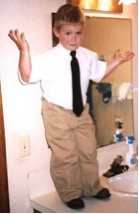I was convinced I knew it all when I was 13 years old. I ignored my parents and my high school counselor and graduated early, in November of my senior year when I was just 15 years old. I turned 16 that December and started college in January. Looking back, I regret missing all the traditional high school senior activities my former classmates enjoyed. But at that time all I could think about was gaining my independence and being on my own.
 I was sick and tired of my parents controlling my life. It seemed like I’d been having one long argument with my father as long as I could remember. I thought the only way to get out from under the tyrannical oppression was to hurry up, get a college degree, and start earning my own money.
I was sick and tired of my parents controlling my life. It seemed like I’d been having one long argument with my father as long as I could remember. I thought the only way to get out from under the tyrannical oppression was to hurry up, get a college degree, and start earning my own money.
So why is it so difficult for me to understand my teenage son’s attitude? My only child turned 18 four months ago. And he quickly let us know that he was now an adult and he wanted full control of his life. No, I thought, he’s still my child. I haven’t taught him everything he needs to know yet.
I don’t mean to control him but I do have a few years more life experience that he can learn from. How can he expect me to keep my mouth shut when I see him making a poor choice? It’s so hard for me to wait for him to ask me for help when I think I know exactly what action he should take. And who knows better than me what is in his best interest?
On the other hand, hadn’t I declared my own independence as a teen? I fought with my parents to be able to follow my own will. But now that I’m nearly 57 years old, I know that if humans are left alone to do whatever seems “right in their own eyes,” they end up making poor choices (see the book of Judges). Like King David we are all born sinners (Psalm 51:5). We all need training and discipline to drive out the foolishness we’re born with (Proverbs 22:15).
As tempting as it was for me to think that loving my child might be letting him make his own choices, I knew that he couldn’t know what was good for his body, his mind, or his soul for quite some time. According to Sandra Aamodt and Sam Wang in Welcome to Your Child’s Brain, the human brain is not fully developed until one’s early 20s. The parts of the brain responsible for controlling impulses and planning ahead are among the last to mature.
 Still, if I really take time to stop and study it, my son reminds me of myself a lot. We look alike and we both are strong-willed. But in the heat of the moment I don’t seem to be able to find any empathy. Afterwards, when I’m calm, I can re-play the situation and identify with my son even though he insists I have no idea what life is like for him. But in the middle of our conversations when I’m angry and worried about him, I can easily forget how sensitive and intelligent my child is. And I forget how fragile all relationships are and how harsh words can shatter our connection.
Still, if I really take time to stop and study it, my son reminds me of myself a lot. We look alike and we both are strong-willed. But in the heat of the moment I don’t seem to be able to find any empathy. Afterwards, when I’m calm, I can re-play the situation and identify with my son even though he insists I have no idea what life is like for him. But in the middle of our conversations when I’m angry and worried about him, I can easily forget how sensitive and intelligent my child is. And I forget how fragile all relationships are and how harsh words can shatter our connection.
My mother would often smile and comment that my son was behaving like I used to behave. I was too blind or arrogant to see the similarities my mother could see. I thought she couldn’t possibly know anything about what it was like to have a kid with a temperament that was difficult to parent.
I looked to books like Dobson’s The Strong-Willed Child or Townsend’s Boundaries with Teens. I still couldn’t control my anger and never seemed to have enough energy to stay calm when my son kept disobeying me—especially when he tried to talk me out of believing that I have any authority.
When he was young, all it took was a mention of the 5th commandment about honoring your father and mother. But the older he got, the longer his arguments became. He just will not give up!
 So, the reality is that my son is 18 years old, and he’s registered in the Selective Service System with over 16 million other men potentially subject to being drafted into the United States military. He is an adult with adult responsibilities whether I like it or not.
So, the reality is that my son is 18 years old, and he’s registered in the Selective Service System with over 16 million other men potentially subject to being drafted into the United States military. He is an adult with adult responsibilities whether I like it or not.
Over the past couple of months, we have written up an agreement that outlines the behaviors we will follow as a household of three adults. We’re not sure this is the best way to handle things, but we are prayerfully taking one step at a time.
